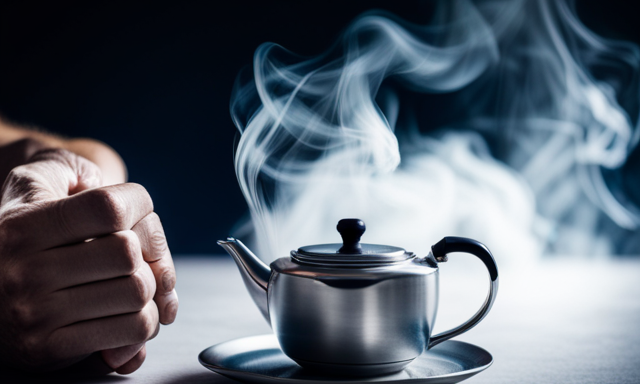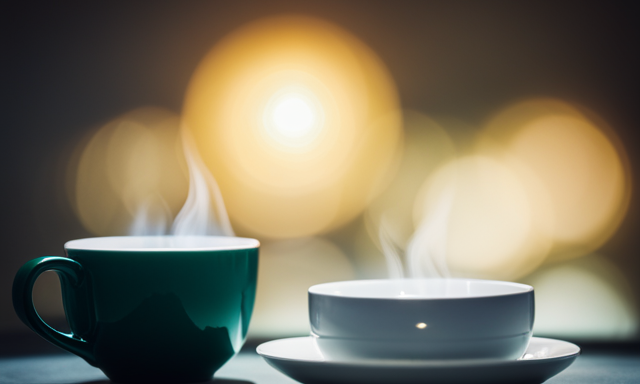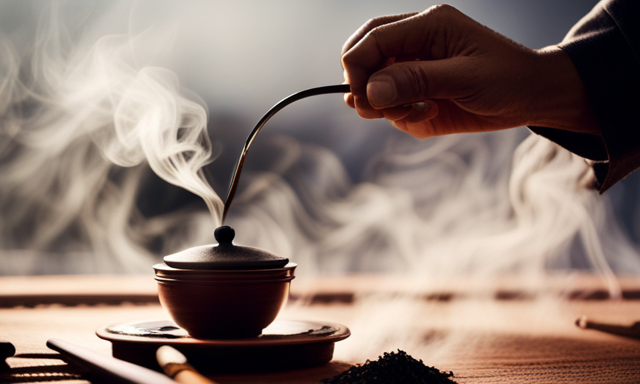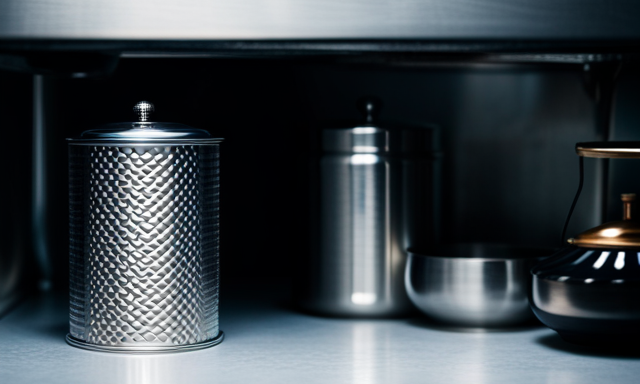Have you ever questioned why a seemingly innocent cup of oolong tea can make you feel sick? I understand. Being a dedicated tea enthusiast, I have also felt this discomfort and looked for explanations for this confusing occurrence. In this article, we will examine the ingredients of oolong tea, investigate possible reasons for nausea, and find solutions to ease this unpleasant feeling.
By understanding the science behind oolong tea and its impact on our bodies, we can make informed choices to ensure a more enjoyable tea-drinking experience. So, if you’ve ever found yourself feeling sick after sipping on a cup of oolong tea, stick around. Together, we’ll uncover the reasons behind this reaction and explore alternative tea options for those with sensitive stomachs.
Let’s dive in and unravel the mystery of why oolong tea can make us feel sick.
Key Takeaways
- Consuming oolong tea on an empty stomach can cause discomfort, including symptoms such as nausea, stomach cramps, and diarrhea.
- Drinking oolong tea before bedtime may disrupt sleep.
- Having a light snack or meal before drinking oolong tea can help prevent discomfort.
- Exploring alternative tea options, such as chamomile, peppermint, and ginger tea, can provide similar benefits without causing discomfort.
Understanding the Components of Oolong Tea
If you’ve ever wondered why oolong tea sometimes leaves you feeling a bit queasy, it could be helpful to understand the various components that make up this unique and intriguing beverage.
Oolong tea is partially oxidized, meaning it falls between green and black tea in terms of oxidation level. This process gives oolong tea its distinct flavor and aroma. It also retains many of the health benefits associated with both green and black teas, such as antioxidants and potential weight management properties.
However, the same compounds that contribute to its health benefits can also cause discomfort in some individuals. For example, oolong tea contains caffeine, which can lead to digestive issues in sensitive individuals. Additionally, the tannins present in oolong tea may contribute to feelings of nausea.
These potential causes of discomfort will be further explored in the subsequent section about potential causes of nausea after drinking oolong tea.
Potential Causes of Nausea After Drinking Oolong Tea
When it comes to feeling sick after drinking oolong tea, there are several potential causes to consider. One possible reason could be caffeine sensitivity, as oolong tea contains caffeine, which can affect individuals differently.
Another factor to consider is the tannin content in oolong tea, as high levels of tannins can lead to stomach discomfort in some people.
Lastly, individual digestive sensitivities may also play a role, as everyone’s body reacts differently to certain foods and beverages. Understanding these factors can help shed light on why oolong tea may be making you feel nauseous.
Caffeine Sensitivity
Feeling sick after drinking oolong tea? Your sensitivity to caffeine might be the culprit. Caffeine intolerance can lead to adverse reactions in some individuals, causing symptoms such as nausea, stomach discomfort, and even vomiting. Here are four reasons why caffeine sensitivity can make you feel sick after consuming oolong tea:
-
Increased stomach acid production: Caffeine stimulates the production of stomach acid, which can irritate the stomach lining and lead to feelings of nausea.
-
Delayed gastric emptying: Caffeine can slow down the rate at which your stomach empties its contents, leading to a feeling of fullness and discomfort.
-
Dehydration: Caffeine is a diuretic, meaning it increases urine production and can cause dehydration. Dehydration can contribute to feelings of nausea.
-
Central nervous system stimulation: Caffeine stimulates the central nervous system, which can lead to feelings of anxiety and an upset stomach.
Now, let’s explore the next section about the tannin content of oolong tea.
Tannin Content
The tannin content in oolong tea can sometimes leave you with a dry mouth and a slightly bitter aftertaste. Tannins are natural compounds found in plants, including tea leaves. When oolong tea is brewed, tannins are extracted and released into the liquid.
These tannins can bind to proteins and create a dry sensation in the mouth. Despite this potential side effect, oolong tea offers various health benefits. It contains antioxidants that can help protect against cell damage and reduce the risk of chronic diseases. Some studies suggest that oolong tea may aid in weight management and improve heart health.
However, it’s important to note that individual digestive sensitivities can also contribute to feeling sick after consuming oolong tea.
Individual Digestive Sensitivities
If you have individual digestive sensitivities, oolong tea may not agree with your stomach and can lead to discomfort. Each person’s body is unique, and certain foods and beverages may not be well-tolerated due to individual preferences or dietary restrictions. Oolong tea contains compounds that can stimulate the digestive system, such as caffeine and theophylline. These compounds can increase stomach acid production and may contribute to feelings of nausea or indigestion in sensitive individuals. To help visualize the impact of individual sensitivities, consider the following table:
| Sensitivity Level | Reaction |
|---|---|
| Low | Mild discomfort |
| Medium | Nausea |
| High | Severe stomach pain |
Understanding your own digestive sensitivities can help you make informed choices about what you consume. In the next section, we will explore proper brewing techniques to minimize discomfort without compromising the flavor and benefits of oolong tea.
Proper Brewing Techniques to Minimize Discomfort
To minimize any discomfort, you should ensure you brew your oolong tea with proper techniques. Here are three key factors to consider:
-
Brewing time: Steeping your oolong tea for too long can lead to a stronger flavor and higher caffeine content, which may contribute to feelings of nausea. It’s recommended to steep oolong tea for 3-5 minutes to achieve a balanced taste.
-
Water temperature: Oolong tea is best brewed with water that’s around 190-200°F (87-93°C). Using water that’s too hot can result in a bitter taste and potential digestive discomfort. Allow the water to cool for a few minutes after boiling before pouring it over your tea leaves.
-
Tea quality: High-quality oolong tea leaves sourced from reputable sources can make a difference in taste and digestion. Opt for loose leaf oolong tea instead of tea bags, as they tend to be of higher quality.
By following these brewing techniques, you can enjoy a better oolong tea experience with reduced chances of discomfort.
Now, let’s explore ways to manage nausea with accompanying remedies.
Managing Nausea with Accompanying Remedies
When it comes to managing nausea caused by drinking oolong tea, there are a few remedies that have been found to be effective. One option is to drink ginger or peppermint tea, as both of these herbs have been known to soothe an upset stomach.
Another strategy is to eat a small snack before consuming oolong tea, as having something in your stomach can help to prevent nausea.
Lastly, it’s important to avoid drinking oolong tea on an empty stomach, as this can exacerbate feelings of discomfort.
Drinking Ginger or Peppermint Tea
Try drinking some soothing ginger or peppermint tea, it might just relieve that sick feeling and bring you some much-needed comfort. These herbal remedies have been used for centuries to calm upset stomachs and reduce nausea.
-
Ginger tea: Ginger has been studied for its anti-nausea properties and can help relax the muscles in your digestive system. It also has a warming effect that can ease discomfort.
-
Peppermint tea: Peppermint is known for its soothing properties and can help alleviate nausea and digestive issues. It has a calming effect on the stomach and can also help relieve bloating and gas.
Both chamomile tea and these herbal remedies can be beneficial for managing nausea. However, it’s important to note that everyone is different, and what works for one person may not work for another.
To further address your discomfort when drinking oolong tea, consider eating a small snack before consuming it. This may help alleviate any potential stomach upset.
Eating a Small Snack Before Consuming Oolong Tea
Munching on a small snack before sipping oolong tea, your discomfort may fade away like a distant memory. Incorporating healthy eating habits can play a crucial role in preventing the uneasy feeling that some individuals experience after consuming oolong tea. By consuming a small snack, such as a handful of nuts or a piece of fruit, before enjoying your cup of oolong tea, you can help alleviate any potential discomfort. This is because having a light snack helps to stabilize blood sugar levels, which can contribute to a more balanced digestive system. Additionally, oolong tea itself offers a range of benefits, including aiding in weight management, supporting heart health, and boosting brain function. However, it is important to note that consuming oolong tea on an empty stomach may exacerbate the discomfort. Therefore, it is advisable to avoid drinking oolong tea without having a meal or snack beforehand. This will help ensure a more pleasant tea-drinking experience.
Avoiding Drinking Oolong Tea on an Empty Stomach
To avoid feeling uncomfortable, it’s best not to drink oolong tea on an empty stomach. When consumed without food, oolong tea can cause nausea, stomach cramps, and even diarrhea in some individuals. To ensure a pleasant experience, consider the following tips:
- Avoid drinking oolong tea before bedtime to prevent potential sleep disturbances.
- Have a light snack or meal before consuming oolong tea to help buffer its effects on the stomach.
- Oolong tea may have potential benefits for weight management, as it can boost metabolism and aid in fat oxidation.
- Remember to drink oolong tea in moderation as excessive consumption may lead to adverse effects.
- If you continue to experience discomfort after drinking oolong tea, it’s recommended to seek medical advice.
By following these guidelines, you can enjoy the potential benefits of oolong tea without any unpleasant side effects. If symptoms persist, it’s important to consult a healthcare professional.
Seeking Medical Advice if Symptoms Persist
If symptoms persist, make an appointment with a medical professional to seek sound advice and solutions. It’s important to consult a healthcare provider if you continue to feel sick after drinking oolong tea. This could be a sign of a potential underlying health condition that needs to be addressed. A medical professional will be able to evaluate your symptoms, take into account your medical history, and provide appropriate guidance. To make the writing more enjoyable and relatable, let’s take a look at a 2 column and 4 row table:
| Seeking Professional Help | Potential Underlying Health Conditions |
|---|---|
| Make an appointment with a medical professional | Digestive disorders such as acid reflux or gastritis |
| Share your symptoms and medical history | Food allergies or sensitivities |
| Discuss any medications you are taking | Irritable bowel syndrome (IBS) |
| Follow their recommendations for further evaluation | Other gastrointestinal conditions |
If you’re experiencing ongoing discomfort from oolong tea, it’s crucial to seek medical advice in order to determine the cause and explore alternative tea options for sensitive stomachs.
Exploring Alternative Tea Options for Sensitive Stomachs
One option to consider for individuals with sensitive stomachs is exploring different types of tea. While oolong tea may not agree with your stomach, there are alternative tea options that can provide the same benefits without causing discomfort.
Herbal teas, in particular, are known to be gentle on the stomach and offer a range of health benefits. Chamomile tea, for instance, is known for its calming properties and can help soothe an upset stomach. Peppermint tea is another great option as it can aid digestion and relieve nausea. Ginger tea is also beneficial for sensitive stomachs, as it has anti-inflammatory properties that can ease digestive discomfort.
By incorporating these alternative tea options into your routine, you may find relief from the symptoms that oolong tea may cause.
Frequently Asked Questions
Can oolong tea cause stomach ulcers?
Oolong tea does not directly cause stomach ulcers. However, it may aggravate existing ulcers due to its caffeine content. If you experience discomfort, it’s best to consult a healthcare professional for a proper diagnosis and advice.
Can oolong tea cause diarrhea or constipation?
Oolong tea can cause digestive issues like diarrhea or constipation due to its caffeine content. Caffeine stimulates the digestive system, which can lead to changes in bowel movements. It’s important to drink oolong tea in moderation and listen to your body’s response.
Is it safe to drink oolong tea while pregnant?
Drinking oolong tea while pregnant may have potential risks. It’s important to consult with your healthcare provider for personalized advice. When breastfeeding, moderate consumption is generally considered safe, but again, consult your doctor.
How long does it take for oolong tea to cause nausea after consumption?
Oolong tea can cause nausea shortly after consumption if you are sensitive to caffeine. However, the long-term effects of oolong tea include potential health benefits such as improved digestion, weight management, and reduced risk of chronic diseases.
Can oolong tea interact with certain medications and cause nausea?
Oolong tea can interact with certain medications like blood pressure medication and antidepressants, potentially causing nausea. It’s important to consult with a healthcare professional to understand any potential interactions between oolong tea and your medications.
Conclusion
In conclusion, understanding the components and potential causes of nausea after drinking oolong tea can help manage the discomfort. By following proper brewing techniques and considering accompanying remedies, such as ginger or peppermint, individuals can alleviate symptoms.
However, if the nausea persists, it’s important to seek medical advice to rule out any underlying health conditions. Interestingly, a study conducted by the Journal of Food Science found that oolong tea contains high levels of antioxidants, which can provide numerous health benefits when consumed in moderation.
So, while oolong tea may cause temporary discomfort for some, it’s still a valuable beverage with potential health advantages.










